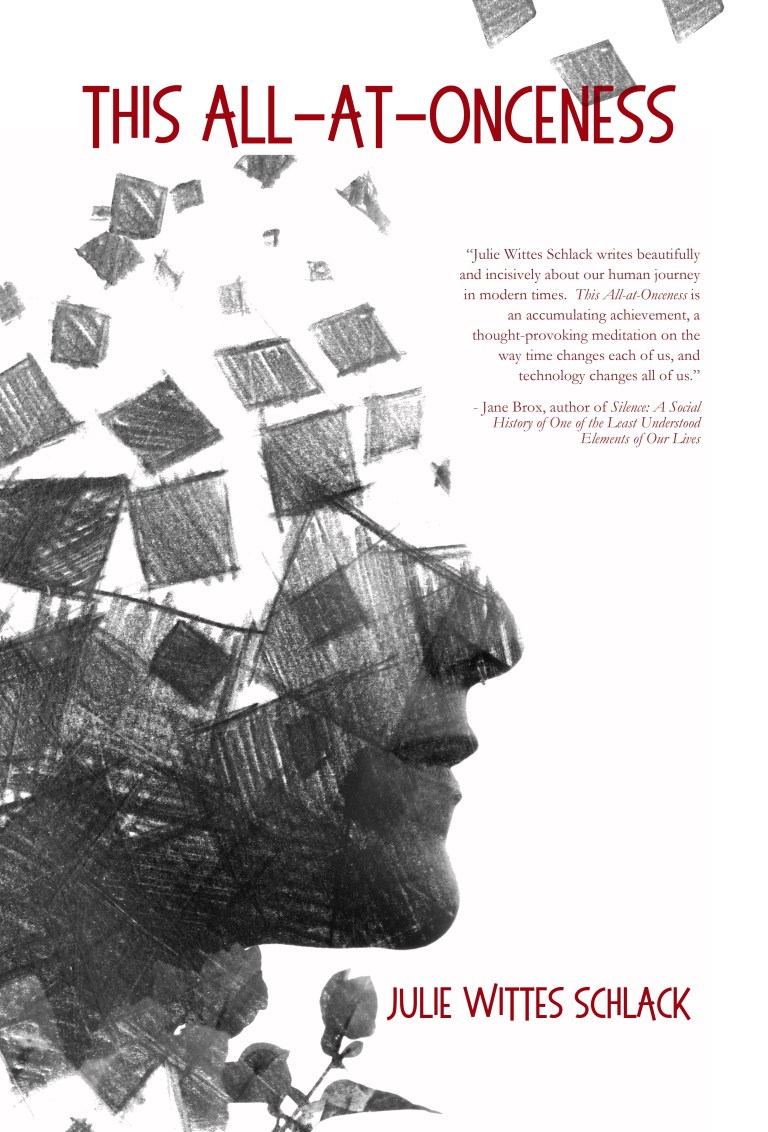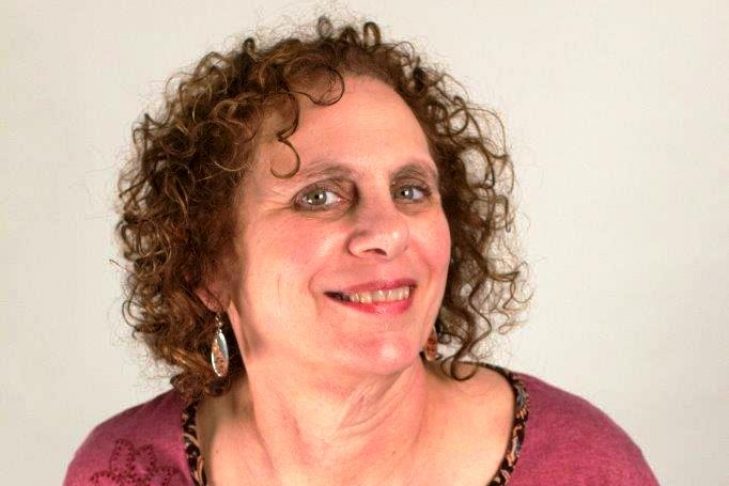In “This All-At Onceness,” Cambridge-based writer Julie Wittes Schlack offers a poignant, thoughtful memoir in essays about growing up in 1960s Jewish Montreal, her time at a progressive Jewish summer camp and the leftist politics that influenced her in college and beyond. Childhood family vacations in a lake house in Quebec give a view of a family haunted by the Holocaust. Her time working in a factory in Allentown, Pennsylvania, in the 1970s follows her political awakening. We learn about Schlack’s life through vivid scenes and engaging prose—hallmarks of her work.
By the 2000s, Schlack has a career in high tech. However, glimmers of her political activism come through when she witnesses the Occupy movement and the election of Donald Trump. The former gives her hope, and the latter appalls her. Schlack, who is also a regular contributor to WBUR’s Cognoscenti, writes on an array of topics that include the intersection of technology with culture, politics and memoir. She recently spoke to JewishBoston about her new book, the joys of growing up Jewish in Montreal and her political activism.
You begin your memoir in the present, which is located in the business world. What led you to make that choice?
I felt that I needed to establish the context for the themes that I would be exploring in the other linked essays in the book. But at the end of that first essay, it flashes back to adolescence and what life is going to be. It was a springboard for essays arranged more thematically than chronologically.
Growing up, you were aware of members of your extended family who died in the Holocaust. What effect did their deaths have on you?
The Holocaust was very present when I was growing up. There were camp survivors in the Montreal Jewish community. The sight of some people with numbers tattooed on their arms was puzzling, frightening and even intriguing to me as a kid. My parents’ generation grew up in the thick of the Second World War. My father heard Hitler on the radio. As an impressionable kid, that memory infiltrated my bones. Seeing jerky films of Hitler at those rallies and listening to his striking voice was like discovering the monster in the closet. Couple that with the fact that my aunt was on one of the last Kindertransport trains out of Vienna. She met my uncle in England when she was a refugee and he was a soldier. My aunt’s history colored who she was. Although she talked little about her experience or her parents’ experiences in the war, it was an epigenetic thing. The descendants of Holocaust survivors carry something of that trauma within them. I witnessed it in my cousins. The effects of the war were ever present in them.

Your memoir beautifully integrates the major social movements of the ‘60s and ‘70s. How did those movements impact you?
Remember the tagline that the personal is political and the political is personal? Feminism is where I felt that was truest. Growing up, there were careers women didn’t do, and job ads were still segregated by sex. In the ‘60s and ‘70s, I was developmentally becoming a more autonomous person. But I was doing so in the shadow of media depictions of women in shows like “Father Knows Best” and “The Donna Reed Show.” The gap was also notable in movie depictions of women and their actual experiences. Not only did I experience that as someone coming of age during the sexual revolution, but women like my mother and my aunt, who were more conventional in their upbringing and their lives, felt so suffocated by those expectations. Their experiences influenced me as well. Anti-war and civil rights activism was also hugely important to me.
You and your husband were intentionally working class during the ‘70s in Allentown, Pennsylvania. What were some of the lessons you gleaned from that time?
What led to the time in Pennsylvania was a growing radicalization in college, where I became increasingly aware of my own privilege. The dogma of Marxist politics had some allure for me, in that there was an explanation for everything. What led us to work in a factory in Allentown was a desire to broaden our experiences. I asked questions, such as did I believe capitalism was inherently oppressive? Should I align myself with its victims? But Marxist dogma was dogma and something that I chafed against pretty quickly. I gradually became comfortable with ambiguity. The fundamental values that led us to Allentown still persist but have manifested in other ways in recent years.
One of the takeaways in the book is that you are frustrated over how little social progress we’ve made as a country, and yet you’re optimistic.
Since writing the book, I’m more despairing and more optimistic. My kids’ generation is amazing. They are growing up with the knowledge that their lives won’t be materially better than ours. Things will be worse, probably. For example, the planet will be in significantly worse shape. They have a clear-eyed vision of the world they’re living in, and that has made them self-reliant, resourceful, scrappy and non-materialistic. They’re also politically fired up and progressive and savvy. They make me hopeful.
At the end of the book, you explain the title of your memoir, “This All-At-Onceness,” and ask: “After all, what is memory if not this all-at-onceness, this thrumming sense of who-you-were embedded and inseparable from who-are-you?”
I stole it from Marshall McLuhan, who was talking about television as a hot medium and the significance of real-time broadcasting. “This all-at-onceness will lead to something,” he asserted. The phrase riveted me. The starting point for the book was in thinking about my work life, where we’re constantly on and monitoring social media. We’re trying to be aware of what is happening and what is emerging. So much of that is about simultaneous experience.
This all-at-onceness also pertains to high-tech and the world we’re living in. But it’s also about consciousness and memory. We’re always carrying our past into our present. A single sight or a certain smell will elicit memory. It may reveal aspects of identity that we take for granted. We are almost always simultaneously living in the past and present and even in the future.



